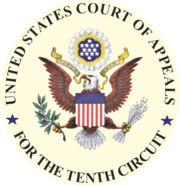Forsyth County, Georgia v. The Nationalist Movement, 505 U.S. 123 (1992), was a case in which the United States Supreme Court limited the ability of local governments to charge fees for the use of public places for private activities. By a 5–4 vote, the court ruled that an ordinance allowing the local government to set varying fees for different events violated the First Amendment due to the lack of "narrowly drawn, reasonable, and definite standards" governing the amount of the fee.
Ayotte v. Planned Parenthood of Northern New England, 546 U.S. 320 (2006), was a decision by the Supreme Court of the United States involving a facial challenge to New Hampshire's parental notification abortion law. The First Circuit had ruled that the law was unconstitutional and an injunction against its enforcement was proper. The Supreme Court vacated this judgment and remanded the case, but avoided a substantive ruling on the challenged law or a reconsideration of prior Supreme Court abortion precedent. Instead, the Court only addressed the issue of remedy, holding that invalidating a statute in its entirety "is not always necessary or justified, for lower courts may be able to render narrower declaratory and injunctive relief."

William Andrew Edmondson is an American lawyer and politician from the state of Oklahoma. A member of the Democratic Party, Edmondson served as the 16th Attorney General of Oklahoma from 1995 to 2011. Prior to his election as state attorney general, he served as district attorney for Muskogee County, Oklahoma, from 1983 to 1992. He was defeated twice in campaigns for U.S. Congress in Oklahoma's 2nd congressional district, where his father Ed Edmondson served from 1953 to 1973.

Paul Jacob is an American activist, organizer, and advocate for legislative term limits, initiative and veto referendum rights, and limited government in the United States. He writes a weekly column for Townhall.com and his short radio commentary feature, "Common Sense," is syndicated by the Citizens in Charge Foundation on over 120 radio stations around the U.S. He has held positions with the U.S. Libertarian Party, U.S. Term Limits, Americans for Limited Government, the Citizens in Charge Foundation and the Sam Adams Alliance.
District of Columbia v. Heller, 554 U.S. 570 (2008), was a landmark decision of the US Supreme Court ruling that the Second Amendment to the United States Constitution protects an individual's right to keep and bear arms, unconnected with service in a militia, for traditionally lawful purposes, such as self-defense within the home, and that the District of Columbia's handgun ban and requirement that lawfully owned rifles and shotguns be kept "unloaded and disassembled or bound by a trigger lock" violated this guarantee. It also stated that the right to bear arms is not unlimited and that guns and gun ownership would continue to be regulated. It was the first Supreme Court case to decide whether the Second Amendment protects an individual right to keep and bear arms for self-defense or if the right was intended for state militias.
Michael R. Murphy is a Senior United States Circuit Judge of the United States Court of Appeals for the Tenth Circuit.
The Virginia State Board of Elections (SBE) was created in 1946 as a nonpolitical agency responsible for ensuring uniformity, fairness, accuracy and purity in all elections in the Commonwealth of Virginia. The SBE promotes the proper administration of election laws, campaign finance disclosure compliance, and voter registration processes in the state by promulgating rules, regulations, issuing instructions, and providing information to local electoral boards and general registrars. In addition, the SBE maintains a centralized database of statewide voter registration and election related data.
Monroe Gunn McKay was a United States Circuit Judge of the United States Court of Appeals for the Tenth Circuit.

Nader v. Brewer, 531 F.3d 1028 is a 2008 decision by the Ninth Circuit ruling that certain Arizona voting regulations were unconstitutional under the First Amendment to the United States Constitution.
Citizens for Tax Reform v. Deters, 518 F.3d 375, was a decision that overturned an Ohio statute that made it a felony to pay petitioners by the signature.
Bogaert v. Land was a federal lawsuit filed on July 18, 2008, in the United States District Court for the Western District of Michigan by Rose Bogaert against Terri Lynn Land in Land's official capacity as Michigan Secretary of State. Bogaert claimed that her rights under the U.S. Constitution were violated by MCL 168.957, the Michigan statute that forbids recall signatures to be collected by people who live in a district other than the district of the legislator whose recall is sought. The action filed by Bogaert was a 42 U.S.C. 1983 civil rights action.
Buckley v. American Constitutional Law Foundation, Inc., 525 U.S. 182 (1999), was a United States Supreme Court case that dealt with the authority of states to regulate the electoral process, and the point at which state regulations of the electoral process violate the First Amendment freedoms.

The Citizens in Charge Foundation (CCF) is a nonprofit, non-partisan organization that advocates in favor of direct democracy. It was founded by libertarian activist Paul Jacob who has served as its president since its founding in 2001.
Meyer v. Grant, 486 U.S. 414 (1988), was an important decision by the United States Supreme Court on paid petition circulation. Colorado was one of several states with a process for citizens to propose initiatives for the ballot, which if passed became law. One of the requirements was to get the signatures of a significant number of registered Colorado electors. Colorado prohibited initiative sponsors from paying for the circulation of these petitions. The state argued this was necessary to "protect[...] the integrity of the initiative."
Frisby v. Schultz, 487 U.S. 474 (1988), was a case in which the Supreme Court of the United States upheld the ordinance by the town of Brookfield, Wisconsin, preventing protest outside of a residential home. In a 6–3 decision, the Court ruled that the First Amendment rights to freedom of assembly and speech was not facially violated. The majority opinion, written by Justice Sandra Day O'Connor, concluded that the ordinance was constitutionally valid because it was narrowly tailored to meet a "substantial and justifiable" interest in the state; left open "ample alternative channels of communication"; and was content-neutral.

Same-sex marriage has been legal in the U.S. state of Oklahoma since October 6, 2014, following the resolution of a lawsuit challenging the state's ban on same-sex marriage. On that day, following the U.S. Supreme Court's refusal to review the case that found the ban unconstitutional, the federal Tenth Circuit Court of Appeals ordered the state to recognize same-sex marriage.

Kitchen v. Herbert, 961 F.Supp.2d 1181, affirmed, 755 F.3d 1193 ; stay granted, 134 S.Ct. 893 (2014); petition for certiorari denied, No. 14-124, 2014 WL 3841263, is the federal case that successfully challenged Utah's constitutional ban on marriage for same-sex couples and similar statutes. Three same-sex couples filed suit in March 2013, naming as defendants Utah Governor Gary R. Herbert, Attorney General John Swallow, and Salt Lake County Clerk Sherrie Swensen in their official capacities.
Microsoft Corp. v. United States, known on appeal to the U.S. Supreme Court as United States v. Microsoft Corp., 584 U.S. ___, 138 S. Ct. 1186 (2018), was a data privacy case involving the extraterritoriality of law enforcement seeking electronic data under the 1986 Stored Communications Act, Title II of the Electronic Communications Privacy Act of 1986 (ECPA), in light of modern computing and Internet technologies such as data centers and cloud storage.
Sharp v. Murphy, 591 U.S. ___ (2020), was a Supreme Court of the United States case of whether Congress disestablished the Muscogee (Creek) Nation reservation. After holding the case from the 2018 term, the case was decided on July 9, 2020, in a per curiam decision following McGirt v. Oklahoma that, for the purposes of the Major Crimes Act, the reservations were never disestablished and remain Native American country.
Americans for Prosperity Foundation v. Bonta, 594 U.S. ___ (2021), was a United States Supreme Court case dealing with the disclosure of donors to non-profit organizations. The case challenged California's requirement that requires non-profit organizations to disclose the identity of their donors in the state tax returns. The case was consolidated with Thomas More Law Center v. Bonta. In July 2021, the Supreme Court ruled in a 6–3 decision that California's requirement burdened the donors' First Amendment rights and was not narrowly tailored, and thus invalid.






